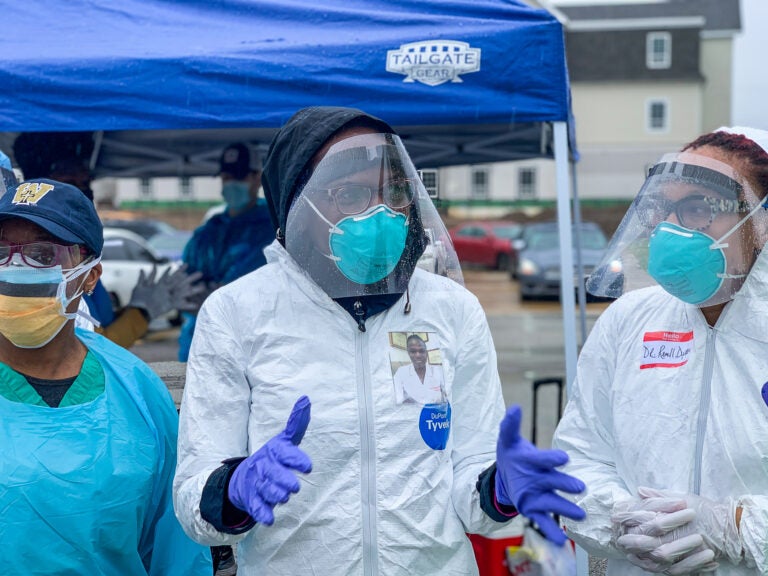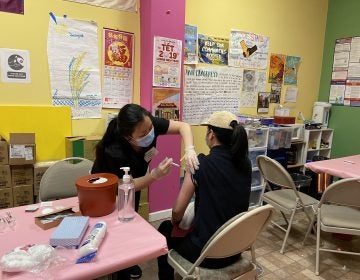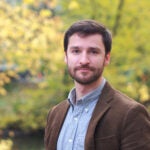Black clergy convene to discuss the toll of COVID-19 and a way forward
The online convening sought to look at the many effects and possible solutions to the disproportionate impact of COVID-19 on communities of color.

Flanked by fellow doctors, Dr. Ala Stanford, founder of the Black Doctors COVID-19 Consortium, speaks to reporters in the parking lot of the West Philadelphia Seventh-day Adventist Church. (Christopher Norris/WHYY)
Are you on the front lines of the coronavirus? Help us report on the pandemic.
A group of clergy, health care professionals and city leaders came together online Wednesday evening to discuss how the coronavirus is affecting Philadelphia’s communities of color, and solutions for moving forward.
Organized by Black Clergy of Philadelphia and Vicinity, Forum Philly and the Pennsylvania Progressive Baptist Alliance, the webinar brought together experts working at the forefront of the city’s response to COVID-19 and spoke to the devastating impact the disease is having on Black residents in terms of physical health, mental wellness and resources.
“It’s important to frame this issue in a narrative that is rooted in structural racism,” said Dr. Sharrelle Barber, a professor of epidemiology and biostatistics at Drexel University. “We must name racism as a cause of poor health, because how we name a problem is inextricable from how we solve it,” she said, quoting former New York City commissioner of health Mary Bassett, who now is a professor at Harvard University.
Doctors and clinicians spoke of the disproportionately high rates of infection and death in Philadelphia’s predominantly Black neighborhoods, where rates of COVID-19 are 23 percent higher than in the city overall. They also spoke of the mounting impacts of job loss, social isolation and uncertainty.
“I’ve seen a lot of my clients have increased anxiety, and even those persons who have not ever experienced anxiety are now at a higher sense of anxiety,” said Rev. Ann Colley, a minister and therapist.
“It’s going to be very important that we put a substantial amount of resources behind mental health in organizations and associations that are culturally competent,” Colley said to map a way forward for communities of color struggling under months of dealing with the virus.
In the meantime, she stressed exercise, limiting time spent looking at news and social media, and maintaining regular relationships.
“Social distancing does not mean social isolation,” Colley said.
Many of those who spoke stressed finding solutions after months of grim and devastating events.
“Our members are dying,” said Salima Pace, a leader within local 1199C, a union representing hospital and health care employees, many of whom have become infected in the course of their work. “This is beyond a labor-management issue, this is a humanity Issue,” Pace said.
Clergy members described steps they’d taken to protect their congregations, including voluntarily closing churches to prevent viral spread.
Rev. Marshall Mitchell of Salem Baptist Church described how the Black Doctors COVID-19 Consortium came together to bring free testing to people in Black communities.
“We’ve done ministry in the world,” Mitchell said, noting that the federal government had failed to adequately equip communities in Philadelphia. “For African Americans, we simply could not wait.”
Mitchell said the growing number of burials is one indication to the clergy of how severe the pandemic is in the city.
“We were doing so many funerals,” he said, noting that at one point he was presiding over one of 10 services taking place simultaneously at the same cemetery.
Elected leaders from the city, state and congressional delegation spoke of the coming hardship from reduced budgets and an economy in a deep recession. Some expressed reserved optimism that the pandemic might create opportunities for reforms, but would be difficult to make a reality.

Get daily updates from WHYY News!
WHYY is your source for fact-based, in-depth journalism and information. As a nonprofit organization, we rely on financial support from readers like you. Please give today.



![CoronavirusPandemic_1024x512[1]](https://whyy.org/wp-content/uploads/2020/03/CoronavirusPandemic_1024x5121-300x150.jpg)


